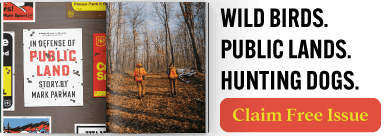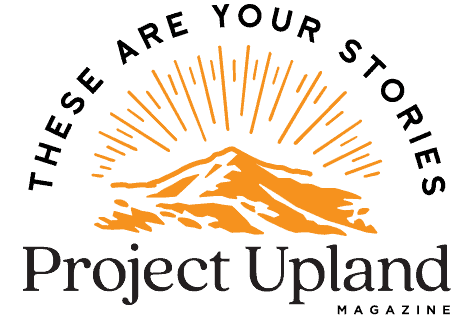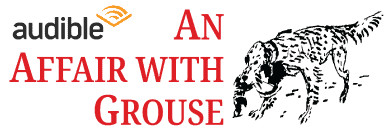Home » Hunting Dogs » Standard Poodle – Hunting Dog Breed
Standard Poodle – Hunting Dog Breed
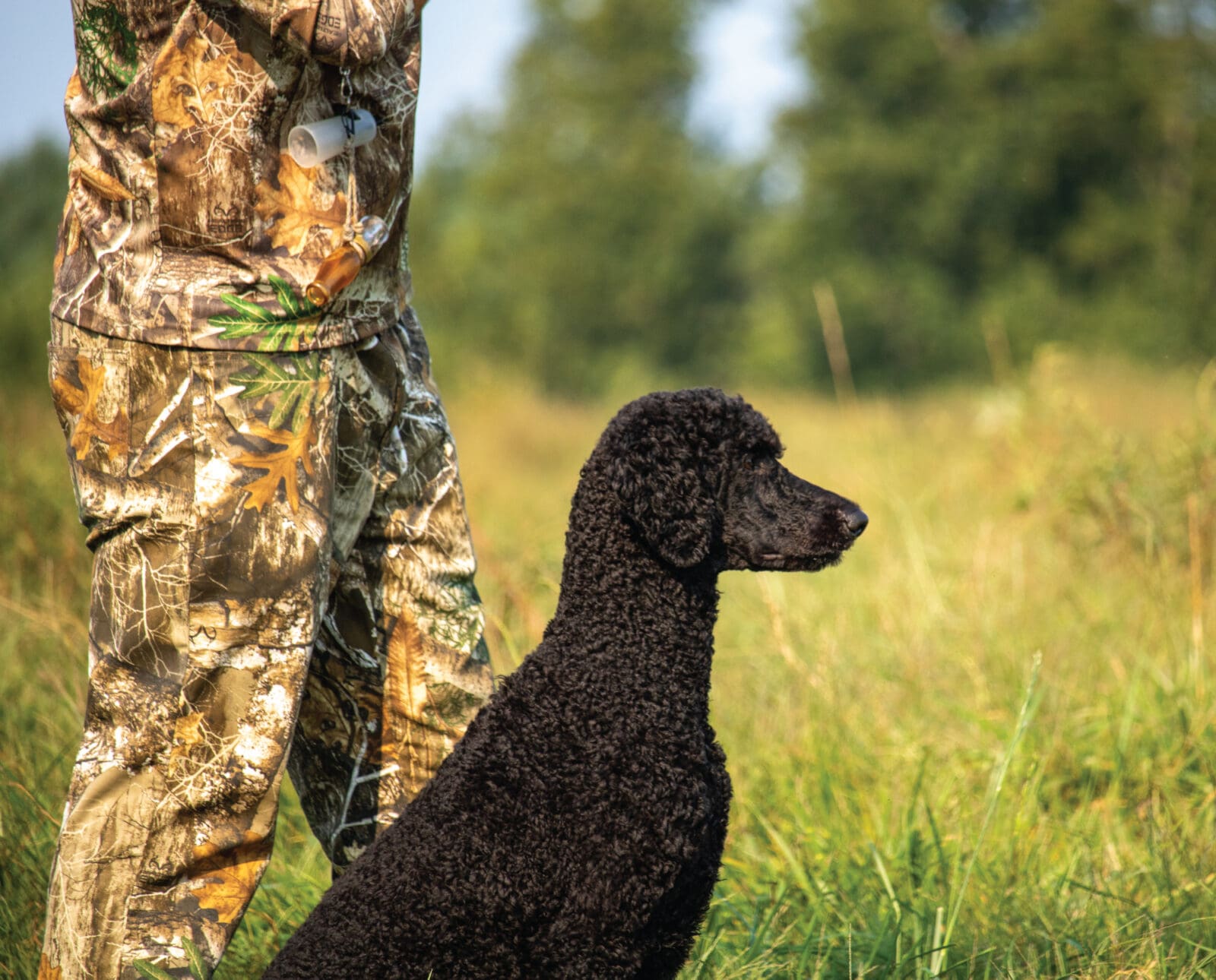
Jennifer Wapenski is the Director of Operations and Managing Partner…
Think Poodles are just for show? Think again! Dive into the world of Poodles as hunting dogs, uncovering their history, skills, and why they’re a solid choice for hunters.
As any owner of a rare hunting dog knows, the reputation of that breed often rides on your shoulders when you show up for a hunt test or a day afield with friends. Your dog may be the only representative of the breed that your fellow hunters ever encounter, so it’s likely to leave a lasting impression—good or bad.
Listen to more articles on Apple | Google | Spotify | Audible
For Domenick Muoio and his Standard Poodle, this pressure isn’t overwhelming; on the contrary, he enjoys the chance to show what Poodles can accomplish in the field.
“I don’t think that others really expect the level of performance that she has, so they tend to be pleasantly surprised. I get a lot of really positive comments about her, especially from judges who may have seen one or two Poodles in the past and were a little underwhelmed.”
Saylor is a two-year-old female Poodle and Domenick’s first hunting retriever. He didn’t originally have hunting plans for her—she was meant to be a companion pet and has no hunting titles in her pedigree—but as a duck hunter, he quickly recognized her drive and natural retrieving aptitude and thought he might be able to channel Saylor’s drive into hunting.
Turns out, he was right. Saylor achieved her Seasoned Hunting Retriever title through the Hunting Retriever Club (HRC), part of the United Kennel Club (UKC) system, and has her sights set on achieving a Hunting Retriever Champion title in the next year or two.
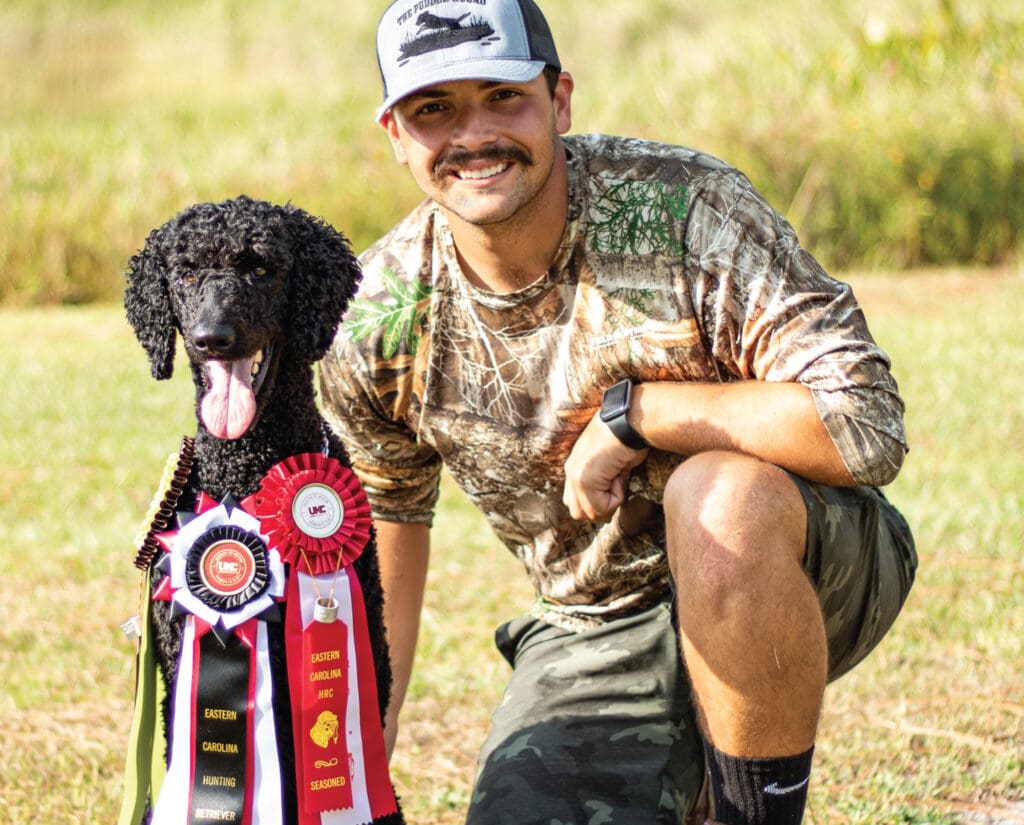
Training a Poodle as a Hunting Dog
While training Saylor to a started level, Domenick found a passion for dog training and took an opportunity to work in a kennel under the mentorship of renowned trainers. While in that role, he gained training experience with a variety of working dog types, ranging from detection dogs to gun dogs, which served him well when figuring out how to approach training with his young Poodle.
“I’ve always been taught to train the dog that’s in front of you—meaning you can’t apply the exact same techniques and approach that worked with another dog. Dogs are individuals. You have to know the dog well enough to read them and understand their needs,” Domenick says. “Being a versatile and dynamic trainer allows you to train the same concepts in different ways, keeping the dog engaged without getting bored.”
The topic of boredom also came up in conversation with Rich Louter, who owns Louter Creek Hunting Poodles. Rich is a well-known trainer and advocate for the hunting Poodle, with hundreds of dogs on his training resume. To say he’s seen the full spectrum of Poodles in the field would be an understatement.
“You have to be willing to think outside the box,” Rich says. “You can’t run endless drills and you can’t overdo it. You have to make it fun and, better yet, make the training seem like it was their idea.”
Rich avoids boredom and keeps morale high by incorporating variety in his approach to training. To do this, he takes advantage of the Poodle’s versatility in the field and in the water. If he senses a dog is getting bored with blind retrieves, he’ll take them for a run in a bird field. If they are getting a little too antsy in the field, he’ll take them to the water for a change of pace. He stresses the need to keep the dogs balanced and to fully utilize their broad set of skills. Not only does this help with keeping training fun and interesting, but it also prepares the dogs for any hunting situation that they may encounter in the field.
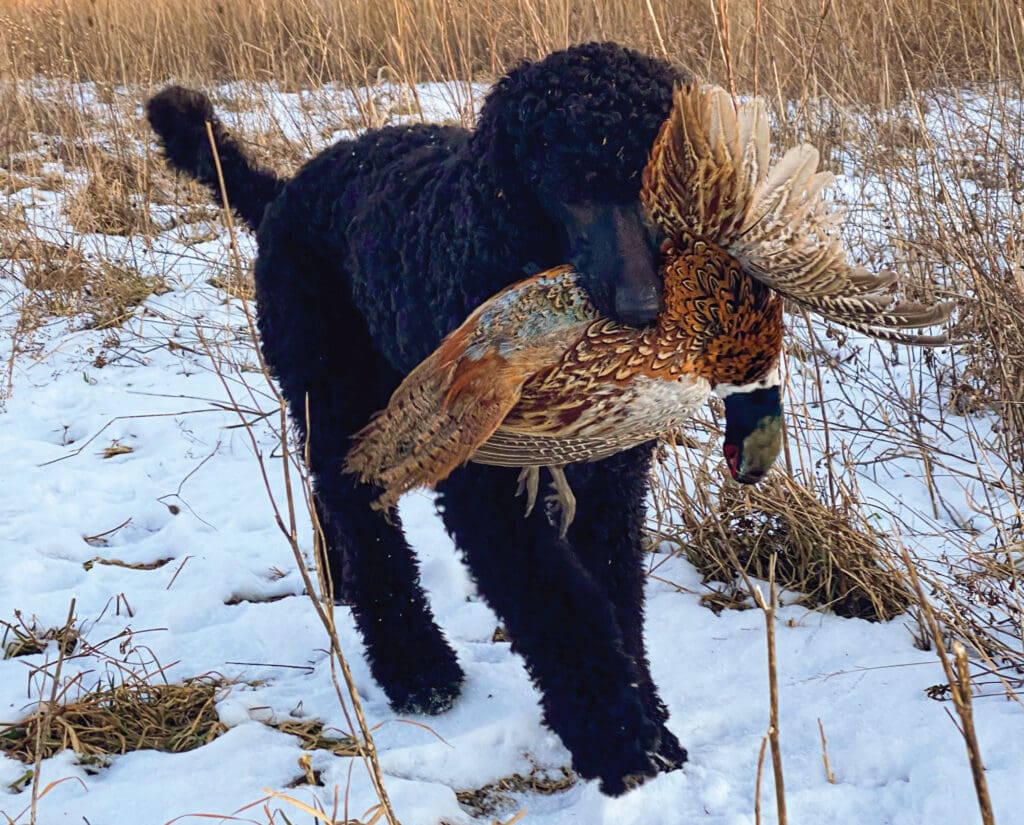
When it comes to developing a versatile retriever that is equally comfortable on land as it is in water, both Domenick and Rich shared similar thoughts on the value of early exposure. Both trainers agreed that positive encounters with water and with birds are essential for developing drive and setting a foundation for later training.
“Poodles have a reputation for being a little slower to mature, although Saylor was not very slow at all,” Domenick says. “I believe that early exposure to water and a strong natural desire to retrieve really helped lay the foundation for her success.”
Similarly, Rich places a very strong emphasis on the first six months of a Poodle puppy’s development. He makes sure that young dogs have plenty of exposure to water and birds. He doesn’t introduce the concept of field steadiness until later. If that means that they chase training birds in the field, so be it—all in the name of building drive.
“It’s always easier to pull a dog in than it is to push one out,” Rich says, “so I’m looking to build desire for birds at a young age and then teach them steadiness later on. That will come with training, but first you have to build the desire.”
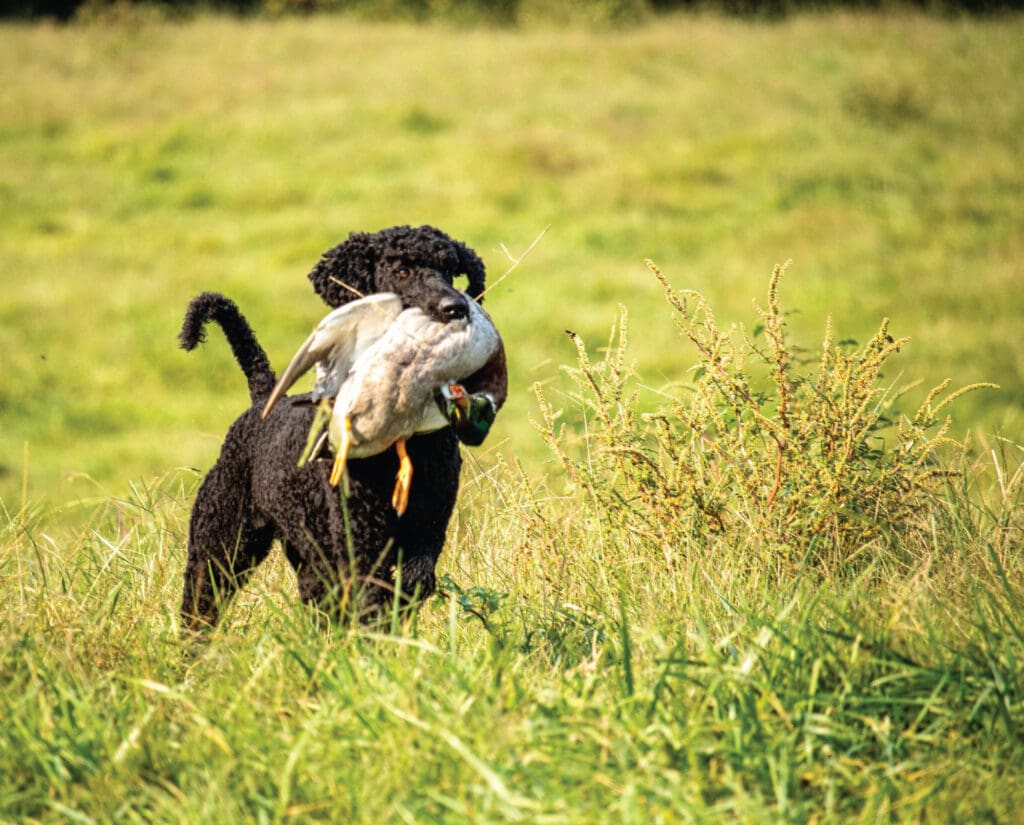
Standard Poodles are Versatile
Ask Rich Louter about his favorite dog and he’ll pause for a second, perhaps uncertain if he should admit to having a favorite among all the greats. But the answer itself isn’t uncertain.
“It’s Cooper. You’ll never find a more versatile dog, more willing to do what he’s asked.”
Rich will tell tales of Cooper’s persistence in tracking wounded game, circling back to pick up the track and continuing until the game was recovered. This independent working style paired well with Cooper’s foundation of retriever training, meaning that he would also sit to whistle and await direction from Rich. Being able to switch back and forth—from independent work to directed work—made him especially valuable on hunting trips to South Dakota that might start with a morning in the duck blind but finish with an afternoon in pursuit of pheasants.
Rich has memorable hunting stories from all of his dogs, past and present. In addition to his local hunting opportunities in Georgia, he takes one or two trips each year to destinations like Arkansas or South Dakota. He recounted stories of his dogs breaking ice to retrieve ducks, including one that—much to the chagrin of the others in his hunting party—had been refused by a Lab. “They all said, ‘Oh no, we can’t let the Poodle outperform the Lab!’ but that’s exactly what happened that day. A duck landed belly-up in the ice and the Lab turned around before reaching it. I lined my dog up, he crunched through the ice, and brought that bird straight to hand.”
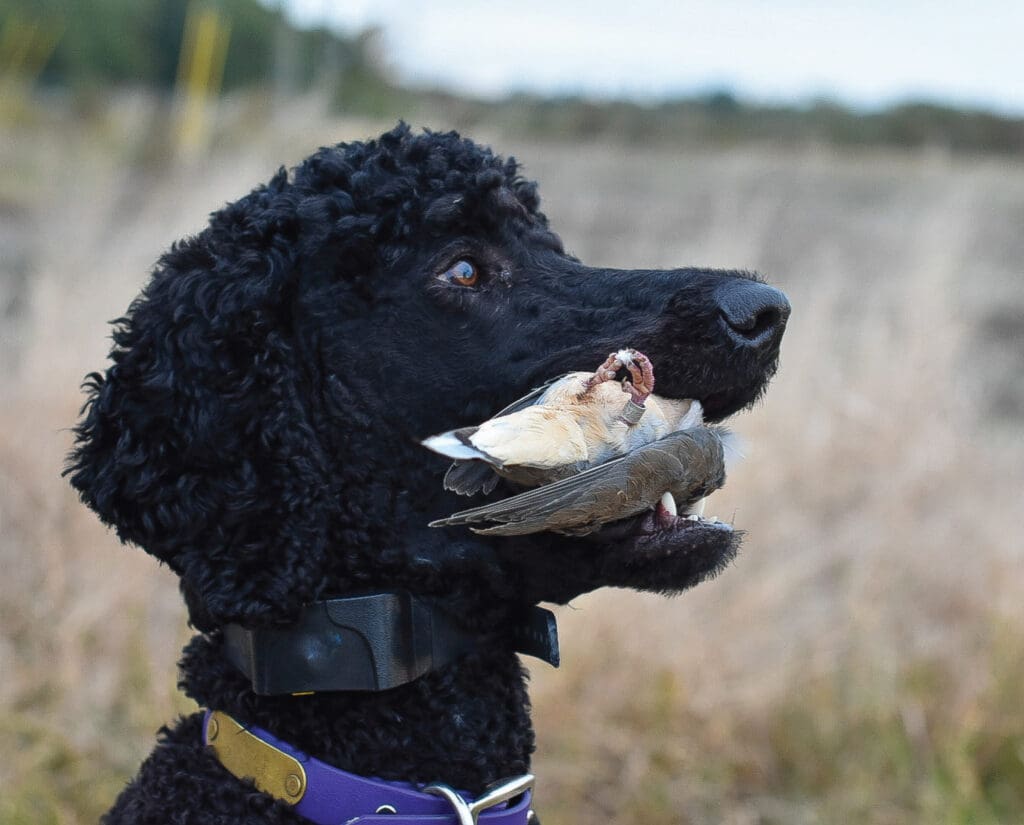
Domenick Muoio’s journey with Saylor is still in its early stages, but his enthusiasm is palpable when he talks about the first bird ever shot over her on a dove hunt. “It was a banded dove, which was incredible and rare. Was it foretelling? Maybe! I knew in that moment that I had something really special with this dog.”
His most memorable hunt with Saylor was a wood duck hunt in his home state of North Carolina. They were just shy of a four-man limit and, to hear him retell it, Saylor’s performance was unforgettable.
“She worked like a seasoned retriever, marking multiple birds from four gunners, picking up countless triples, and running clean blinds with the same eagerness at the end of the hunt as she did with the first bird of the day. That was the moment when the lightbulb came on for me and I realized that she was something very special.”
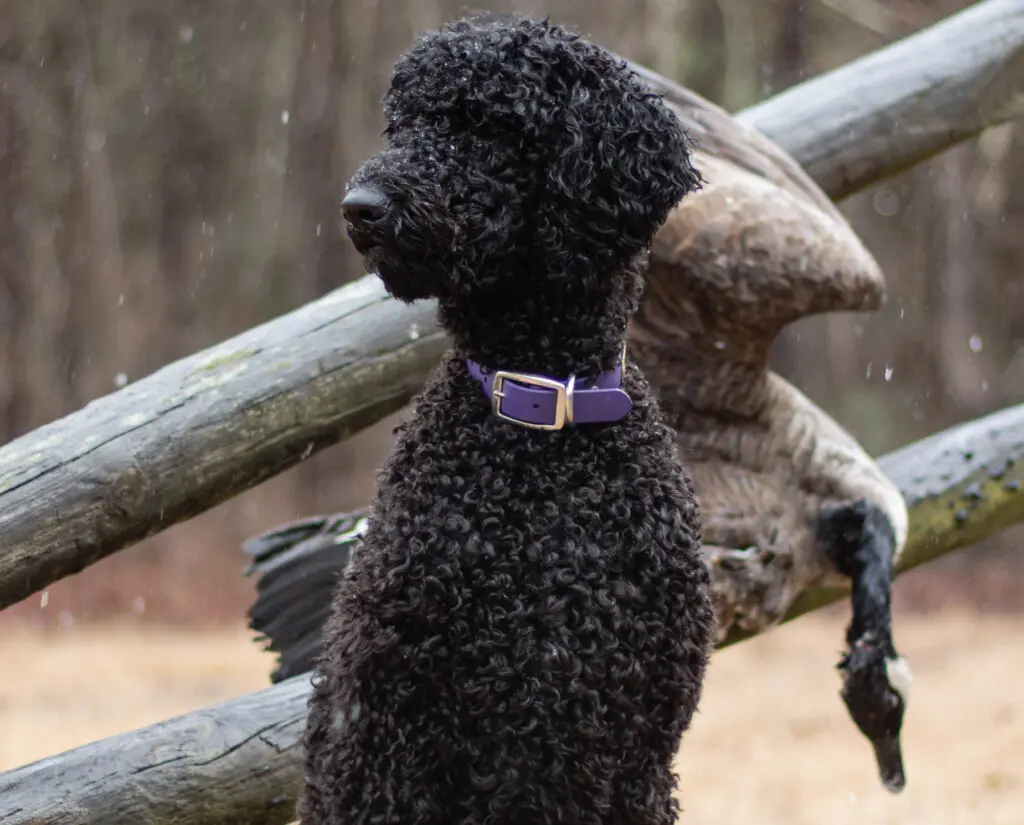
Standard Poodle Hunting Dog Lines and Breeders
Whether or not an actual hunting line of Poodles exists is a topic subject to debate within the greater Poodle community.
On one hand, you have dogs like those bred by the Louters with a strong emphasis placed on hunting, training, and testing, which in turn informs their breeding decisions. The dogs consistently do well in AKC hunt tests and successfully hunt wild birds every year. By all accounts, their line of Poodles shows a strong aptitude for hunting.
On the other hand, you have a proven hunting dog like Saylor who is the first in her line to have any kind of official hunting credentials. As Domenick sees it, her success is more than just an anomaly of a smart dog ending up with a capable trainer. It’s evidence that Poodles across the board are intelligent, fast learners with a strong desire to please. Whether those traits are put to use in the field, in hunt tests, in competitive obedience, in shed dog trials, or in any other canine sport, it comes down to the handler recognizing the strengths in the dog and working to bring them out.
“While genetics and aptitude certainly play a part, whether a Poodle is a ‘hunting Poodle’ really boils down to what you do with it. Poodles are energetic with an eager-to-please nature, which can be funneled in a variety of ways,” Domenick says. In other words, the capability exists even if the opportunity doesn’t.
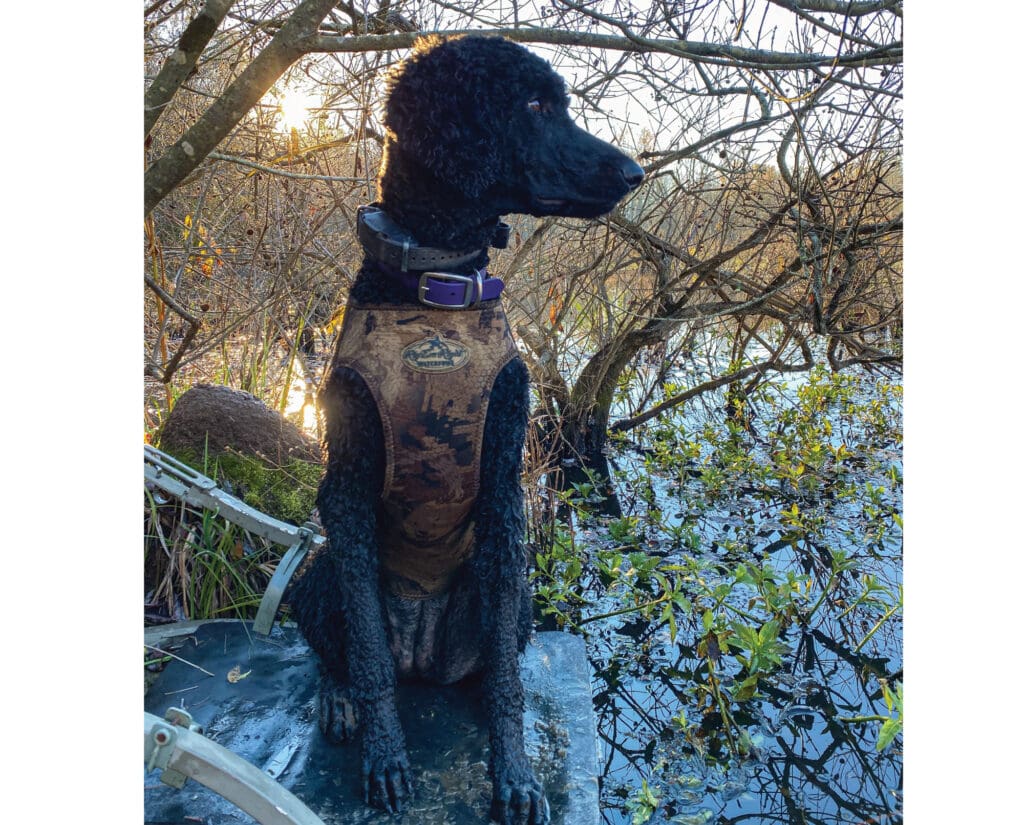
Profiling the Standard Poodle Hunting Dog
As I scribbled notes during my conversations with Rich and Domenick, one thing in particular stood out to me: Domenick’s emphasis on the dog as an individual.
It’s easy to profile a dog breed and talk about typical characteristics in broad strokes. We as humans love to categorize and group things into neat little boxes. And sure, that’s helpful when discussing breeds and standards and understanding what general strengths and weaknesses tend to manifest in our dogs. But it’s an unhealthy tendency when looking at a rare or uncommon breed and assuming that all the dogs are somehow stamped out from the same mold.
Yet we all do it, because we rely on the things we see and experience. For the judges at Saylor’s HRC tests, they will absolutely form an opinion of Poodles based on her impressive performances. The same would also be true if she performed poorly. There simply aren’t enough data points to see individual variations within the breed, unless you’ve dedicated your life to training as many dogs as Rich Louter has.
Conversely, we tend to issue popular dogs a pass, because we’ve all seen many Labs in the field and can attest to the variation between individuals. We all know one Lab that is a retrieving machine and one that prefers the couch above all else. A Lab having a bad day—or an exceptional day—at a hunt test is just that: an individual. We don’t assess the entire breed based on one experience. That same thought should be applied to the rare breeds where individuals only get to represent themselves.
So, if a Poodle might be in the cards as your next hunting dog—or if you’re just curious about how the oft-stereotyped dog actually performs in the field—go meet a few. Browse through social media, attend a hunt test, and reach out to people. Most importantly, remember that each dog you meet is, in fact, an individual, so get to know the variety and embrace it for the spice it provides.
Jennifer Wapenski is the Director of Operations and Managing Partner at Project Upland Media Group. She has a lifelong passion for the outdoors, dogs, and wildlife; as an adult, she discovered that upland bird and waterfowl hunting were natural extensions of these interests. What started as initial curiosity soon escalated into a life-changing pursuit of conservation, advocacy, and education. Jennifer serves in a variety of roles such as the Breed Warden for the Deutsch Langhaar—Gruppe Nordamerika breed club and on an advisory committee for the Washington Department of Fish and Wildlife.

